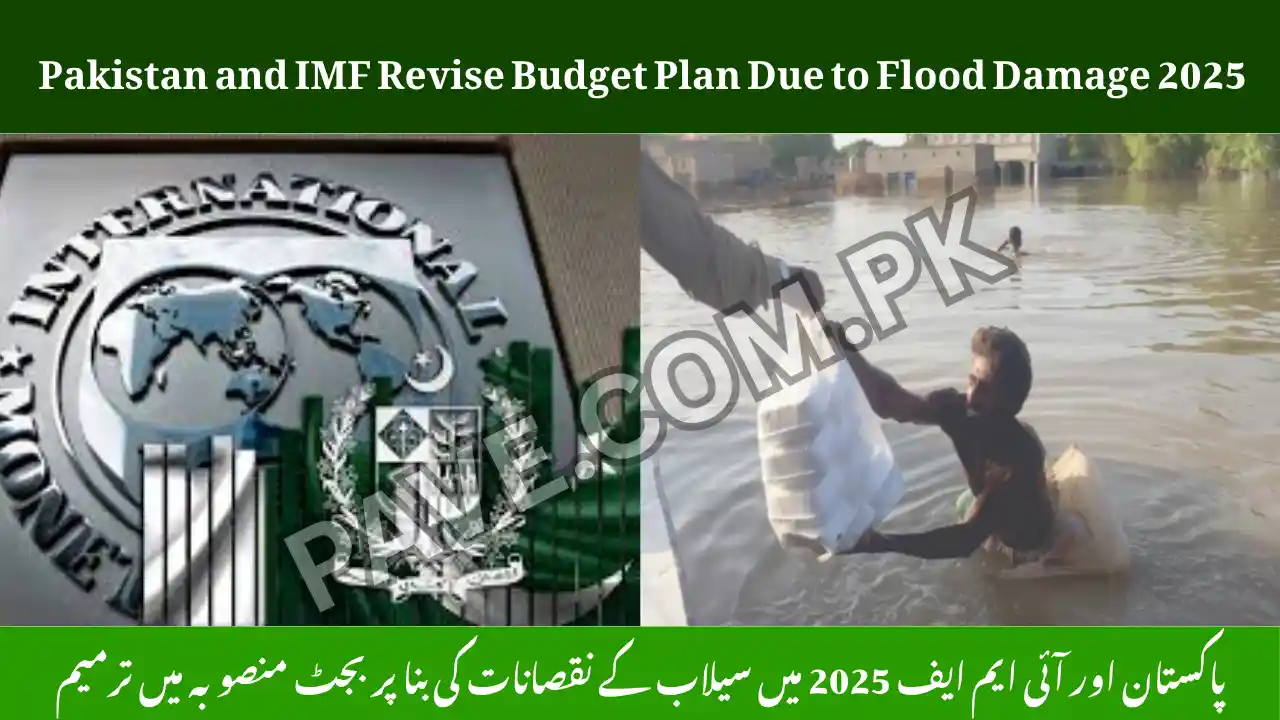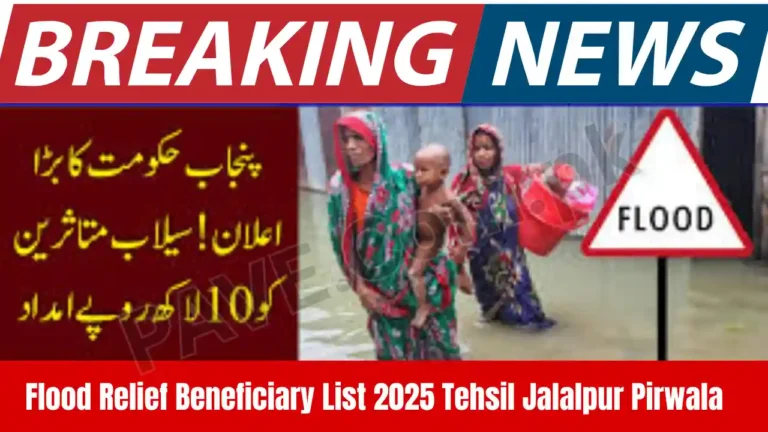Pakistan and IMF Revise Budget Plan Due to Flood Damage 2025 – Economic Adjustment
In a crucial move to stabilize the country’s finances amidst mounting flood damage, Pakistan and the IMF have agreed to revise the national budget plan for the fiscal year 2025. The recent devastating floods, which have severely impacted key sectors of the economy, have led to significant downward revisions of growth forecasts, tax revenue projections, and fiscal targets. Both Pakistan and the IMF have worked closely to develop a revised budget plan that accommodates the fallout from the floods while maintaining fiscal discipline.
This collaboration between Pakistan and the IMF is critical to ensuring continued economic stability, securing the next tranche of funds from the IMF loan to Pakistan, and providing the necessary resources for flood recovery. With these adjustments, Pakistan aims to chart a course for economic recovery while managing the pressures brought about by this natural disaster.
The Growing Need for a Revised Budget Plan in Pakistan
Pakistan’s original economic forecasts for 2025 were based on more optimistic growth targets and revenue expectations. However, the floods have wreaked havoc on the country’s agriculture, infrastructure, and key industries, significantly affecting economic output. This has led both Pakistan and the IMF to recognize the urgency of revising their fiscal policies and adjusting financial projections.
The IMF Revise Budget Plan aims to recalibrate the country’s fiscal framework, ensuring that it can handle the immediate effects of the floods while also laying the groundwork for recovery. The economic adjustment in Pakistan is expected to involve a reallocation of funds, a downward revision of GDP growth targets, and changes in tax revenue goals, all of which are crucial to mitigating the financial losses caused by the disaster.
Read More: GCC Grand Tourist Visa
Flood Damage in Pakistan: A Devastating Blow to the Economy
The floods have caused an estimated loss of Rs. 650 billion across all four provinces, with the damage continuing to rise as floodwaters recede and the full extent of the destruction becomes clearer. The initial estimate of Rs. 371 billion was quickly surpassed as assessments updated with the latest data revealed the magnitude of the disaster.
Pakistan’s flood damage is felt most heavily in the agriculture sector, with millions of acres of crops destroyed, disrupting food supplies and agricultural exports. Infrastructure such as roads, bridges, and buildings has also been severely damaged, adding to the cost of recovery. This has placed considerable strain on the national budget, making it imperative for the government and IMF to work together to find a sustainable way forward.
The revised budget plan now reflects the economic toll the floods have taken, adjusting key revenue and expenditure targets. The total damage, both direct and indirect, is still being assessed, and the final tally may exceed initial estimates.
IMF’s Role in Pakistan’s Budget Revision and Financial Strategy
The IMF loan to Pakistan remains a key source of financial support, and the revisions to the budget plan are aimed at ensuring that Pakistan remains on track with its fiscal commitments while accommodating the needs of flood recovery. The IMF has played a crucial role in guiding Pakistan through this process, helping to balance the need for immediate disaster relief with the long-term objectives of fiscal discipline and economic growth.
With the Pakistan IMF budget revision, the country will recalibrate its revenue collection targets. The original target of Rs. 14.13 trillion has been revised down to Rs. 14 trillion to account for the reduced economic activity caused by the floods. The economic adjustment in Pakistan will involve strategic cuts in non-essential spending, as well as the delayed release of some public development funds.
This adjustment is part of Pakistan’s broader strategy to meet the conditions of its financial assistance agreements with the IMF, ensuring continued access to vital funding. While flood recovery remains a priority, Pakistan must balance these needs with its obligations to international lenders and its goal of maintaining macroeconomic stability.
Read More: IMF Review Mission Arrives in Pakistan for $7 Billion Program
Impact on Pakistan’s Economy and Long-Term Recovery Efforts
As Pakistan and the IMF revise their fiscal targets, the focus remains on stabilizing the economy and minimizing the long-term impacts of the floods. However, the Pakistan economy in 2025 is expected to face significant headwinds. The floods have not only disrupted the agricultural sector but also strained the industrial and services sectors, with production losses expected to continue through the first quarter of the year.
The immediate economic adjustment measures are aimed at providing the necessary resources for flood recovery efforts, such as infrastructure rebuilding, agricultural rehabilitation, and the provision of relief aid. These measures will be complemented by continued support from international donors, including the IMF, World Bank, and other financial institutions, to ensure that Pakistan can recover as swiftly as possible.
Despite these challenges, there are opportunities for economic revitalization, particularly in sectors such as agriculture and infrastructure, which will require large-scale investment in the coming months. The IMF Revise Budget Plan provides a foundation for these recovery efforts, setting realistic fiscal targets while supporting reconstruction and rebuilding.
Key Revisions in Pakistan’s Fiscal Targets:
- Tax Revenue Adjustments: The revised tax revenue targets are set to decrease from the original Rs. 14.13 trillion to Rs. 14 trillion due to the slowdown in economic activity caused by the floods.
- Expenditure Reductions: While the government has avoided cutting vital development funds, there will be slower disbursement of the Public Sector Development Programme (PSDP) to manage fiscal discipline.
- Fiscal Deficit and Primary Surplus: The primary surplus target of 2.4% of GDP will be maintained, but adjustments will be made to expenditure and revenue expectations to ensure the fiscal deficit is contained.
- Flood Relief and Recovery: A significant portion of the revised budget will be allocated for flood recovery, including infrastructure repairs, agricultural aid, and humanitarian assistance.
International Support for Pakistan’s Flood Recovery
As Pakistan navigates the complexities of fiscal revision, it is also receiving critical support from the international community. The IMF loan to Pakistan will play a pivotal role in stabilizing the economy, while other financial institutions like the World Bank and ADB are expected to provide additional funding for the flood recovery impact in Pakistan.
In addition to these financial resources, international expertise and technical assistance will be vital in rebuilding Pakistan’s flood-damaged infrastructure and agriculture. As these sectors are integral to the country’s economic recovery, international cooperation will be key in ensuring a swift and effective recovery process.
FAQs
What is the IMF Revise Budget Plan for Pakistan?
The IMF Revise Budget Plan involves adjusting Pakistan’s fiscal targets, including tax revenue and GDP growth, in response to the severe economic damage caused by floods.
How much damage did the floods cause to Pakistan’s economy?
The floods have caused an estimated Rs. 650 billion in losses, impacting agriculture, infrastructure, and public services.
What are the new tax revenue targets for Pakistan?
The revised tax revenue target for Pakistan has been adjusted to Rs. 14 trillion, down from Rs. 14.13 trillion, reflecting the economic slowdown.
How is the IMF supporting Pakistan’s flood recovery?
The IMF is helping Pakistan adjust its fiscal framework, ensuring financial stability while providing funding for flood recovery efforts.
Conclusion: Moving Forward with a Revised Fiscal Framework
The IMF Revise Budget Plan represents a critical step in Pakistan’s efforts to recover from one of the most devastating floods in recent memory. By recalibrating fiscal targets, managing public expenditure, and securing international support, Pakistan aims to restore its economic stability while laying the groundwork for future growth.
While the path forward will be challenging, the economic adjustment in Pakistan offers an opportunity to strengthen fiscal policies, improve revenue collection, and rebuild the nation’s economic resilience. With the continued support of the IMF and international donors, Pakistan can overcome these challenges and emerge stronger in the years to come.







